In English class, we were told time and time again that the title of the project was equally important as the text, and unfortunately, often neglected. I’ve come to find this to be just as true in the world of music as well- the title speaks volumes and helps solidify projects into a cohesive whole, and sometimes people seem to want to try to find meaning in the minute details without first trying to see what the project was trying to say in its bigger picture.
Dengue Dengue Dengue‘s Siete Raíces, on the other hand, doesn’t make it difficult to understand that this was a project with a strong message. Translated to Seven Roots, the album, from start to finish, is rooted in the sounds of their native country (Peru) and explores an intricate weaving of old and new to bring together DDD’s strongest project thus far.
The duo are known for their exploration of chicha (in simple terms, this is the genre name used for sped up cumbia music), and they manage a healthy medium that straddles both the electronic world and the traditional sounds of the respective artist’s home; this is a balance that the Enchufada label has perfected over the years, and continues to show mastery in with Dengue Dengue Dengue. Opening tracks like “Yuyu” and “La Rama de Tamarindo” skew towards a tribal sound, while “Guarida,” with vocally stunning Sara Van, focuses on a stronger Western style and sound.Both are stunning in varying ways, and strategically spliced in-between, an indicator that the duo are talented at every style they choose to focus on.
“Badman” takes elements of zouk and dub, while “R2” sounds like it could be heard in drum circles around the world. Each track holds a distinct, focused sound, but their ease in which they shift genres is awe-inspiring. “The Enemy” heads toward darker territory, and “Dubcharaca” finds itself in yet a whole other world on its own. DDD display their range and ability to showcase their style, making every single one of these tracks identifiably obvious it is their work, but defying genre roles by pushing the limits of where they can take their carefully crafted style. “Amazonia” completes the overall package with their most original style, and biggest collaborative piece of the entire whole.
Overall, the album is short but perfect. Sitting at a cozy 9 songs, it is only a taste for those of us of who are like ourselves – in constant need of music from Enchufada. However, if experimental sounds from Peru is of interest, there is no better to begin with than Siete Raíces.



